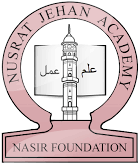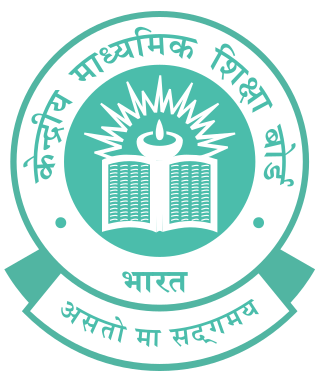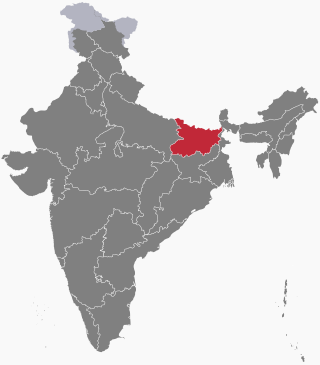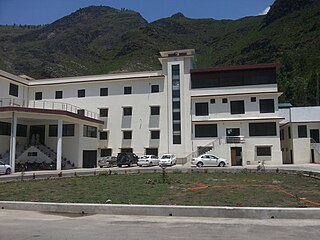Secondary School Certificate (SSC), Secondary School Leaving Certificate (SSLC) or Matriculation examination, is a public examination in Bangladesh, India, Pakistan and Maldives conducted by educational boards for the successful completion of the secondary education exam in these countries. Students of 10th grade/class ten can appear in these. It is equivalent to the year 10 of the GCSE in England or the first two years of high schools in United States.

Nusrat Jahan Schools are a group of non-profit, private, educational institutions in Rabwah (ربوہ), a town in district Chiniot (چنیوٹ), in the province of Punjab. They are owned by the Ahmadiyya Muslim Community and are operated by the Nazarat Taleem Sadr Anjuman AhmadiyyaPakistan. These schools were established under and named after the Nusrat Jahan Scheme; a scheme launched by the community for the educational betterment of its members. These institutions offer programmes of primary, secondary, higher secondary and undergraduate and postgraduate education. Majority of the students enrolled in these schools are Ahmadi Muslims, mostly the residents of Rabwah though these institutions are not exclusively for Ahmadi Muslims and also enroll non-Ahmadi students from Rabwah and its surrounding areas.
Higher Secondary Certificate (HSC), Higher Secondary School Certificate (HSSC) or Higher Secondary Education Certificate (HSEC) is a secondary education qualification in Bangladesh, India and Pakistan. It is equivalent to the final year of high school in the United States and GCSE and/or A level in the United Kingdom.
Academic grading in Pakistan is based on a percentage system.
The Board of Intermediate and Secondary Education, Lahore is an examination board for secondary and intermediate education in Lahore Division.

The Central Board of Secondary Education (CBSE) is a national level board of education in India for public and private schools, controlled and managed by the Government of India. Established in 1929 by a resolution of the government, the Board was an experiment towards inter-state integration and cooperation in the sphere of secondary education. There are more than 27,000 schools in India and 240 schools in 28 foreign countries affiliated to the CBSE. All schools affiliated to CBSE follow the NCERT curriculum especially from class 9 to 12. The current Chairperson of CBSE is Rahul Singh, IAS.
All India Secondary School Examination, commonly known as the class 10th board exam, is a centralized public examination that students in schools affiliated with the Central Board of Secondary Education, primarily in India but also in other Indian-patterned schools affiliated to the CBSE across the world, taken at the end of class 10. The board conducts the examination during the period of February–March. Previously it was taken in March to April every year. In this exam, mathematics, science, and social science are compulsory, with any two languages. Students can also opt skill subject such as information technology, painting, yoga, music or artificial intelligence. Successful candidates are awarded the Secondary School Completion Certificate, a statement of marks, and a migration certificate stating that the candidate has completed secondary schooling and can pursue higher education. For the academic year 2016–17, the Central Board of Secondary Education has revived the old system of syllabus and marking scheme (complete syllabus for All India Secondary School Examination and marks out of 500. India has state exams and central exams. From 2017 to 2018 and later academics year use old format. The answer sheets are formulated by the teachers appointed by the CBSE because of which the results may vary and cannot be made a strong evidence for assessment of a student's knowledge and understanding of the subject . The result is produced and published by CBSE usually after 40 days of the exams. The exams are easy and a good preparation could be done in 2 to 3 months. Although the exams are given much importance, their results have less to do with the afterlife of students pursuing STEM in India but they can play a major role in the careers of other students. Also, these exams are not competitive and hence students are not advised to take much stress in the preparation and instead should enjoy their time.
Presentation Convent High School, Sargodha, Pakistan, was founded by the Presentation Sisters and is regulated by the Catholic Board of Education under the Roman Catholic Diocese of Islamabad-Rawalpindi.

The Board of Intermediate and Secondary Education, Faisalabad is an examining board for intermediate and secondary education in Faisalabad Division.

Board of Intermediate and Secondary Education, Rawalpindi is a government agency whose main object is to conduct examinations of SSC and HSSC and declare their results. The Board is autonomous in nature.

The Board of Intermediate and Secondary Education, Gujranwala is an examination board for secondary and intermediate education in Gujranwala Division.
The Board of Intermediate and Secondary Education, Sargodha is a government board for intermediate and secondary education examination. It is located in Sargodha, Punjab. Pakistan
The Azad Jammu & Kashmir Board of Intermediate and Secondary Education (AJKBISE) was established in 1973 through an ordinance promulgated by the Government of Azad Kashmir. It is located in Mirpur, Azad Kashmir. Before the establishment of the AJK BISE, educational institutes in Azad Kashmir were included in the jurisdiction of the Board of Intermediate and Secondary Education, Lahore.

The Board of Intermediate and Secondary Education is the intermediate education control government body in Sahiwal Division. Its head-office is located in Sahiwal.
The Board of Intermediate and Secondary Education, Peshawar or BISE Peshawar is a government examinations conducting and assessment body on intermediate and secondary education levels located in Peshawar, Khyber Pakhtunkhwa, Pakistan.

The Bihar School Examination Board is a statutory body under section 3 of the Bihar School Examination Act - 1952, which is functioning under the Government of Bihar devised to conduct examinations at secondary and senior secondary standards in both government and private schools belonging to the state of Bihar.
Cadet College Ghotki is an educational institution from grade 7 to grade 12, in the northern province of Sindh, Pakistan. It is jointly run by the Government of Sindh and the Pakistan Army.

The Board of Intermediate and Secondary Education Swat is an educational governmental body in SWAT, which conducts the exams, assign duties, and register the educational institutes in the region.It is headed By UMAR Hussain as secretary and Muhammad Ishaq as chairman.








